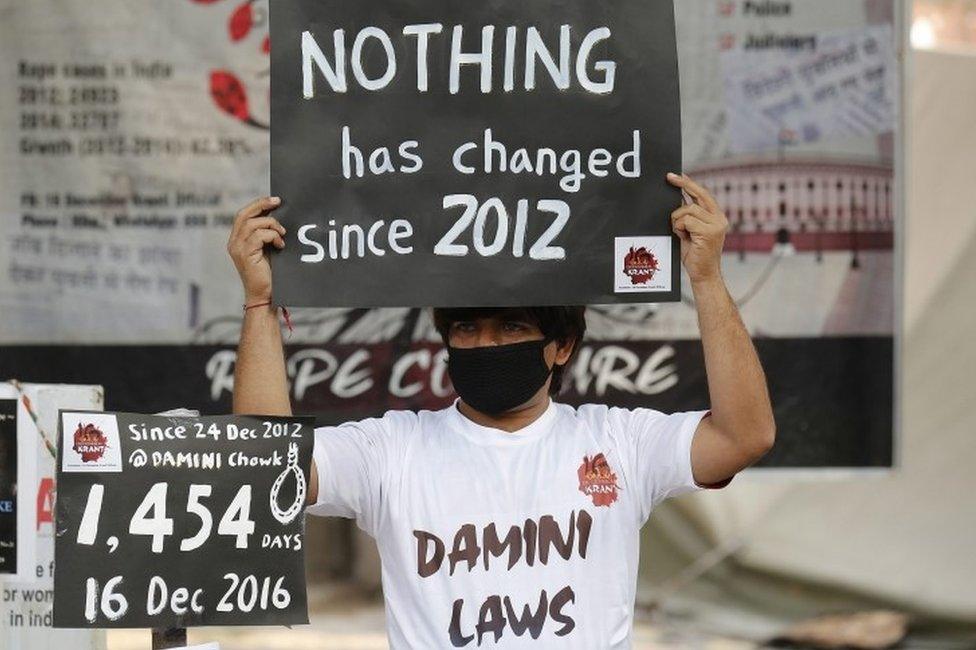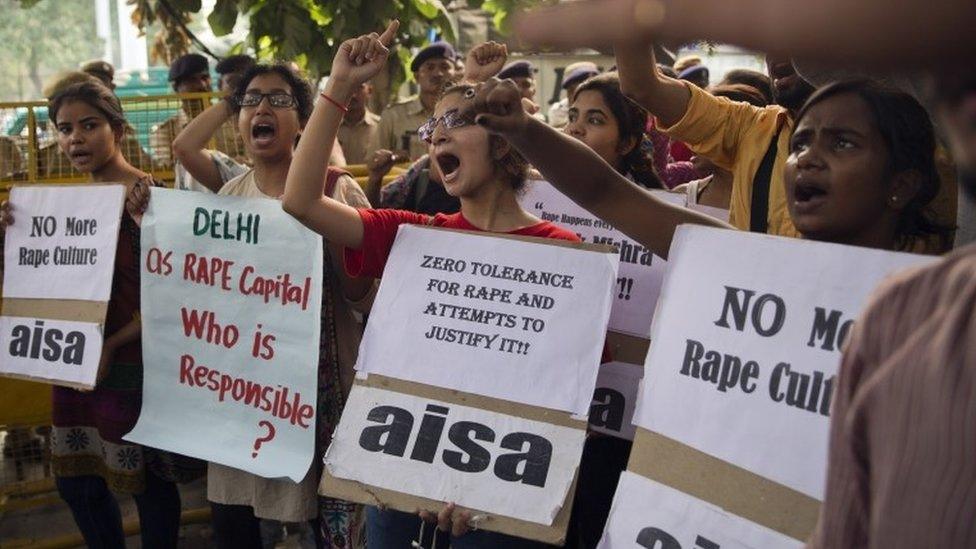How myths and stereotypes colour rape sentencing in India
- Published

Tough new anti-rape laws were introduced after the brutal gang rape and murder of a student in 2012
India's Supreme Court once gave an array of curious reasons about why an Indian woman would not make a false rape claim.
In a 1983 judgement, the top court said that western and Indian women were vastly different.
In the West, the judges said a woman may level a false allegation of sexual molestation against a man because she may be a "gold digger", suffering from neurosis, hold grudges against men, want to gain notoriety, be jealous and so on.
"By and large these factors are not relevant in India," the judges said.
The court said an Indian woman in the "tradition bound, non-permissive society" would not lie about being sexually assaulted because such an allegation would lead to her being socially ostracised, "risk losing the love and respect" of her husband and relatives, and if unmarried she would fear the rape might hamper her prospects of getting married.
Mrinal Satish, a doctorate from Yale Law School who teaches at Delhi's National Law University, studied this and some 800 other judgements in all courts and found that myths and stereotypes often informed rape sentencing in India.
"Rape myths are highly detrimental to rape victims. They are prejudicial, stereotyped or false beliefs about rape, rape victims and rapists," Dr Satish says in his latest work on reforming rape sentencing in India.
For one, Indian courts, according to law scholars like Ratna Kapur, have for long viewed the typical rape victim as "chaste, pure, monogamous, honourable and confined to the domestic sphere". She would generally be a "virgin or a loyal wife".
Courts also refer to "typical reactions" by victims in court. One court referred to the demeanour of women raped by a guru in Tamil Nadu - two of them broke down while testifying, and another had felt giddy. In another case, the top court observed that a rape victim "feels a deep sense of deathless shame".
Also, Dr Satish points to popular textbooks of medical jurisprudence followed by most courts perpetuating stereotypes regarding rape and victims - one states it is "essential that the woman should resist to her utmost… It would not amount to rape if after half-hearted resistance she gave consent."
Another makes class distinctions, stating a woman belonging to a "labour class" who is "accustomed to hard and rough work, will be able to deal blows on her assailant, and will thus succeed in frustrating his attempts at violation". On the contrary, a well-to-do woman might not be able to resist for long, and might soon "faint from fright or exhaustion".
'Implying consent'
"Some high courts have actually used this as a basis to conclude that the allegation of rape was untrue on the ground that absence of injuries on the victim's body implied consent," says Dr Satish.
"It is troubling that these textbooks are considered an authoritative sources of medical jurisprudence by doctors. So doctors in India may be taught to believe that the presence of injuries on the victim's body is a pre-requisite for proving rape," he says.
In the last four decades the top court has frequently talked about the need for sensitivity in trials of rape cases, but has often failed to exhibit such sensitivity in the sentencing of these cases, says Dr Satish.
"My study shows the loss of chastity/virginity is viewed by courts as the primary 'harm' that rape causes. However if the woman is perceived as unchaste, this impacts on sentencing.

Official figures show the incidence of rape is increasing in India
"Since the law prevents courts from using chastity-related factors when trying to fix guilt during trial, the site of stereotyping has now moved to sentencing, where wide discretion existed until recently."
Examining the judgements, Dr Satish found that higher sentences were given to the convicted man when injuries are present on the body of the victim and sentences imposed on men convicted of raping unmarried woman were higher than those imposed on men convicted of raping married women.
"Thus loss of virginity, damage it causes to unmarried women appears to lead to higher sentences," he says.
'Reciprocal passion'
Also, accused men who were relatives, neighbours, or had a relationship with the victim got lower sentences compared with strangers. Defendants convicted of raping victims with whom they had eloped were also given lower sentences in trial courts, high courts and the Supreme Court.
High courts have reduced sentences in cases of elopement saying the offence had been committed because of "reciprocal passion" and "out of youthful exuberance".
Women rights lawyer Flavia Agnes told me things had improved since tough new anti-rape laws were introduced in the country after the brutal gang rape and murder of a student in 2012 in Delhi - although sexual attacks against women and children continue to be reported across the country.
For one, the discretion of the judges has been reduced with the introduction of mandatory minimum sentences for the convicted: seven years for non-aggravated rape and 10 years for aggravated rape.

The recent cases of rapes have prompted public outpouring of anger and grief
The definition of rape has also been expanded greatly to include oral sex and penetration of objects. A new law dealing with sexual abuse of children below 18 years is gender neutral to include boys.
But Dr Satish told me that there is evidence to prove that courts continue to perpetuate these stereotypes while sentencing men accused of rape.
"Judicial education focused on making judges aware of the stereotypes and biases that influence adjudication is a solution to the problem. Judicial academies conduct such programmes, and these should improve things in the long run," says Dr Satish.